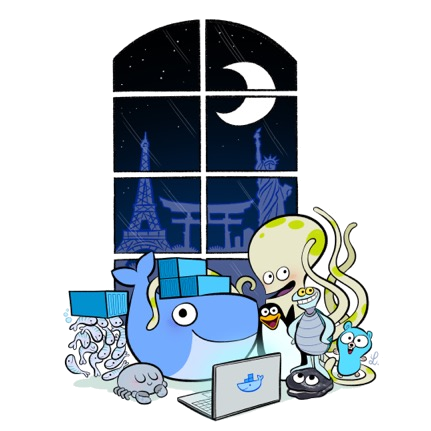Other ways to contribute
Estimated reading time: 5 minutesBeyond the documentation contributions we cover here, there are many other ways to contribute to Docker. Whether you are just getting started or are expert in your field, you have a unique perspective that is a valuable resource to share with others. The Docker community, meetups, mentoring, and open source projects all need your participation, ideas, feedback, and vision.
- Organize a Docker meetup
- Learn about the Docker Community
- Contribute to the Moby open source project
Organize a Docker meetup
Anyone interested in Docker can become an active member of the Docker community by becoming a co-organizer of a Docker Meetup group.
If a Meetup group does not already exist in your area and you are willing to start a new one, the best way to proceed is to contact us so that we can create it for you, as long as it makes sense geographically speaking.
If you have already created a Docker Meetup group that is fine, we ask you to add us as a co-organizer so that we can ensure a consistent support to the group in terms of community and Meetup management.
Before contacting us to create a new Docker Meetup Group, take a look at our Meetup Groups page to make sure a group does not already exist in the area.
Get started putting on a Docker Meetup
Now that you are a co-organizer of a Docker Meetup Group, here are a few tips and suggestions to help you get started:
- Attend similar DevOps or Developers Meetups to gain experience and gauge interest in Docker
- Contact other people interested in Docker to help you organize and promote future Meetups
- Research High-Tech companies in your area willing to host a Docker Meetup event
- Research what would be the best date(s) to schedule the Meetups based on availabilities with regard to competing events in the area and other calendar imperative
- Research what are the topic of interest to your audience prior to set an agenda for the meetup
- Pay attention to the Meetup page aesthetics, add logos and pictures, invite members to leave comments and reply to these comments
- Promote the event on social media and make sure that the list of keywords is well define if you have created the Docker Meetup Group on your own
How Docker can help you organize
We can support the co-organizers of the Docker Meetup Groups based on their specific needs. For instance, we might be able to:
- Send you Docker T-shirts and stickers
- Put you in contact with other people interested in being a co-organizer of a Docker Meetup group, and which are in the same area
- Put you in contact with companies willing to host a Docker Meetup in your area
- Introduce you to people willing to give a lightning talk about Docker
- Promote your Docker Group on Docker.com, Docker Weekly and Social Media Hackday Picture
Host a Docker meetup at your location

Want to host a Docker Meetup?
We are always looking for new office space to host Docker Meetups. If your company is willing to host a Docker Meetup, contact us by email at meetup@docker.com. Previous Docker Meetups have been hosted by companies such as Rackspace, Twitter, MongoDB, BrightCove, DigitalOcean, Viadeo and Edmodo.
How many attendees?
The company hosting the event fixes the number of attendees depending on their office size and availability. This number usually varies between 30 and 200.
How long is a Docker Meetup?
Once again, each company hosting the event decides when does the meetup start, and how long it lasts. Usual meetups tend to last 2 hours, and start between 4pm and 6pm.
Learn about the Docker Community
Go to the Docker Community GitHub repository for resources and information on the community. Those pages are the most up-to-date for finding out about the community and making connections.
The topics below provide some additional links, but it’s likely that everything you need is on the GitHub repository.
Become a Mentor
With millions of Docker users all over the world, there’s always someone who needs a helping hand. Like many open source projects, the Docker project relies on community support channels like forums, IRC, and StackOverflow. You should contribute mentoring if you have good knowledge of:
- how open source projects run
- using Docker in some particular domain (for example, testing or deployment)
- using Git, Go, GitHub, IRC, or other common tools
Also, choose mentoring if you like to be happy. Studies show that helping others is a great way to boost your own well being.
Docker users
Docker users are people using Docker in their daily work. To help Docker users, visit:
- the Docker Community Forum
- the
#dockerchannel on Freenode IRC - StackOverflow
You can also check the lists of open issues on the Docker docs and open issues on the Moby project.
Docker contributors
Docker contributors are people like you, interested in the open source projects and product documentation. Contributors may need help with IRC, Go programming, Markdown, or with other aspects of contributing. To help Docker contributors, visit:
- the Docker Gitter IM room
- the Google group
- the
#docker-devchannel on Freenode IRC
Contribute to the Moby open source project
Docker introduced the open source Moby project to further promote collaboration, experimentation, and development of container-based systems in the broader community. Moby is a library of containerized components, a framework for assembling components into a container platform, and tools to build, test, and deploy artifacts. It included a reference assembly, which is the open base for the Docker platform.
You can read about the Moby project, the open framework, components, and relationship of Docker to Moby at mobyproject.org.
The Moby project lives here.
See Contribute to the Moby project to learn how to help work on the codebase.
meetups, community, mentoring